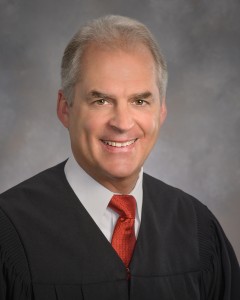
The following is from my interview with Justice Solomon Sabia, believed to be the world’s only totally independent judge.
Q: Mr. Justice, how is it that you are totally independent?
A: I have no accountability. I am a judge in a place where I am not elected by anybody to whom I have to answer. Nor have I been appointed by anybody to whom I am indebted. I have no reliance on any higher power to keep my job, and I am invisible to the public.
Q: You sound like God.
A: Exactly
Q: So … you’re God?
A: I’ve gone by many aliases: Solomon Sabia, Isabella, Bezos. Bill Murray’s character in Groundhog Day offered a useful insight when he said, “Maybe God isn’t omnipotent. Maybe he’s just been around so long, he knows everything.” Let’s just say I’ve been around for a long time.
Q: So, what do you make of the growing threats to judicial independence?
A: Not a problem for me, obviously, but I can see how this would worry you. On the one hand, you have certain irresponsible media. I know, it used to be that no one knew the name or record of any judge, except during Supreme Court confirmation hearings or Judge Judy. Now, there are websites with the address and phone number of the judge who ruled against you in your divorce, and reporters who will write about them. The media don’t seem to care as much about getting stories accurate or protecting privacy as they do about accumulating hits on their websites.
Then there are the pressures from special interest groups who publicly complain and vilify any judge who does not rule according to their dictates.
Q: Have you ever had a story written about you?
A: Plenty! Most are pure fiction, so don’t complain to me about the occasional sloppy media report. Fortunately, I never leave my house; the address is known to no one. My number is unlisted. I generally stay off of social media. And there’s that handy total unaccountability thing. It must suck being you.
Q: Isn’t it better to just appoint all judges for life? Then they’d be independent and free from any pressure.
A: Well, that’s not really independence. It may keep a judge from worrying about losing the job, but it does not keep them from suffering misrepresentation in the media and special interests obsessing about their rulings. Remember that federal judge who changed his ruling after President Clinton criticized him for suppressing evidence? (Judge Harold Baer, 1996). For most people, a lifetime appointment doesn’t make you numb to criticism.
Q: So, if judges are elected, wouldn’t that ensure they get the benefit of public feedback and rule as the law requires?
A: Public feedback is like ice cream: consuming too much of it is not healthy. I saw a TV ad recently for a candidate for an elected state supreme court seat – not in your state of Indiana. She was firing an assault rifle at a shooting range and touting her loyalty to certain people and political positions. I don’t see how that candidate, if elected, could ever be seen as impartial or independent from those people or interests.
Elections turn judges into politicians, which is not good. On the other hand, the typical voter is about as well informed as a clam when it comes to choosing judges. Barring some gigantic scandal, they almost always vote for the incumbent.
Q: So, what’s the answer? Do all judges have to become like you?
A: I have to admit that solitude and longevity do foster independence, but jobs like mine are extremely difficult to find. Isolation won’t work for the average bench sitter because public confidence is part and parcel of a functioning judiciary. Judges like you, David, need to get out, be seen, look more human, say things. Engage with those forces that threaten judicial independence rather than just fearing and trying to ignore them.
Q: You mean debate or argue with political commentators?
A: No, judges are properly above that – and it wouldn’t help anyway. But transparency could go a long way. It would be refreshing to see judges speak publicly and sincerely at times – not a “they said, judge said” tabloid kind of thing but to genuinely educate and explain what happened in a case and how it was decided. Thanks to digital communication technology, freedom of the press is no longer limited to people and businesses that can afford to buy a press.
Q: Sounds like you are suggesting judges have their own podcasts or at least their own public-relations staff.
A: Exactly. Anything that shows the public that judges are real people just like them. Anything that shows how judges work on the everyday problems of everyday people. That’s going to support your democracy.
Q: Sounds like you are ready to come out of your shell.
A: No way, I like it in here. Free WiFi even.
But I can tell you that for you to have real judicial independence – and to deserve it – you’re going to have to face up to what the law requires. That means ruling without biases or preconceptions, no matter how inconvenient and occasionally dangerous it becomes. Sure, media standards have to improve, but so do judicial standards. You and I both know judges who should be taking courses at the NJC or somewhere else. The best judges are continually learning, improving. Look at me. Look at ChatGPT.
The public has to learn that a justice system is a joke unless judges are insulated from pressures and dangers. Those firewalls are necessary to insulate judges so they can do the right thing without fear or hesitation, but also so the public can see and have confidence that judges are insulated and able to do the right thing.
It’s a good system, but like any system it requires maintenance. And that’s your job, not mine.

CHICAGO – The American Bar Association Judicial Division announced recently that TheNational Ju...

The National Judicial College is mourning the loss of former faculty member Judge Duane Harves, who passed ...

As the world manages an evolving natural environment, The National Judicial College announced today that it...

Do’s Manage your cases systematically Devise a system that works for you and your organizational...

After 22 years of teaching judges, Tennessee Senior Judge Don Ash will retire as a regular faculty member a...
